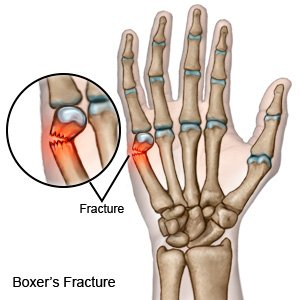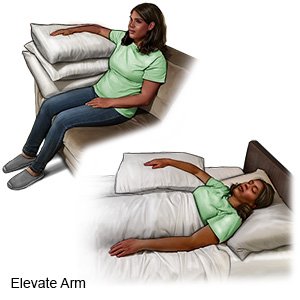Boxer Fracture
Medically reviewed by Drugs.com. Last updated on Apr 6, 2025.
What is a boxer fracture?
A boxer fracture is a break of a bone in your hand. It usually happens in the bone that connects your wrist to your little finger or ring finger.
 |
What are the signs and symptoms of a boxer fracture?
- Pain and swelling around your knuckle and the back of your hand
- Little finger that is twisted inward
- Decreased ability to bend or extend your finger
How is a boxer fracture treated?
Boxer fractures usually heal by 8 weeks after the injury. Treatment depends on the type of fracture and how severe it is.
- Your little finger and ring finger may be taped together if your fracture is mild. You will be able to move your fingers, which will help prevent stiffness.
- Your bone may need to be straightened and a splint or cast applied. These devices will support your fracture while it heals.
- Medicines may be given to decrease pain. Ask your healthcare provider how to take prescription pain medicine safely.
- Surgery may be needed if your fracture is severe. Wires, pins, screws, or plates are used to keep your bones in place while they heal.
How can I manage my symptoms?
- Apply ice on your injury for 15 to 20 minutes every hour for 24 hours or as directed. Use an ice pack, or put crushed ice in a plastic bag. Cover it with a towel. Ice helps prevent tissue damage and decreases swelling and pain.
- Elevate your hand above the level of your heart as often as you can. This will help decrease swelling and pain. Prop your hand on pillows or blankets to keep it elevated comfortably.

- Go to physical therapy if directed. A physical therapist teaches you exercises to help improve movement and strength, and to decrease pain.
When should I seek immediate care?
- You cannot bend or extend your finger.
- You have severe pain.
- You have numbness or tingling in your finger.
When should I call my doctor?
- You have a fever.
- Your open wound is red, swollen, or draining pus.
- You have trouble moving your finger.
- You have questions or concerns about your condition or care.
Care Agreement
You have the right to help plan your care. Learn about your health condition and how it may be treated. Discuss treatment options with your healthcare providers to decide what care you want to receive. You always have the right to refuse treatment. The above information is an educational aid only. It is not intended as medical advice for individual conditions or treatments. Talk to your doctor, nurse or pharmacist before following any medical regimen to see if it is safe and effective for you.© Copyright Merative 2025 Information is for End User's use only and may not be sold, redistributed or otherwise used for commercial purposes.
Further information
Always consult your healthcare provider to ensure the information displayed on this page applies to your personal circumstances.
